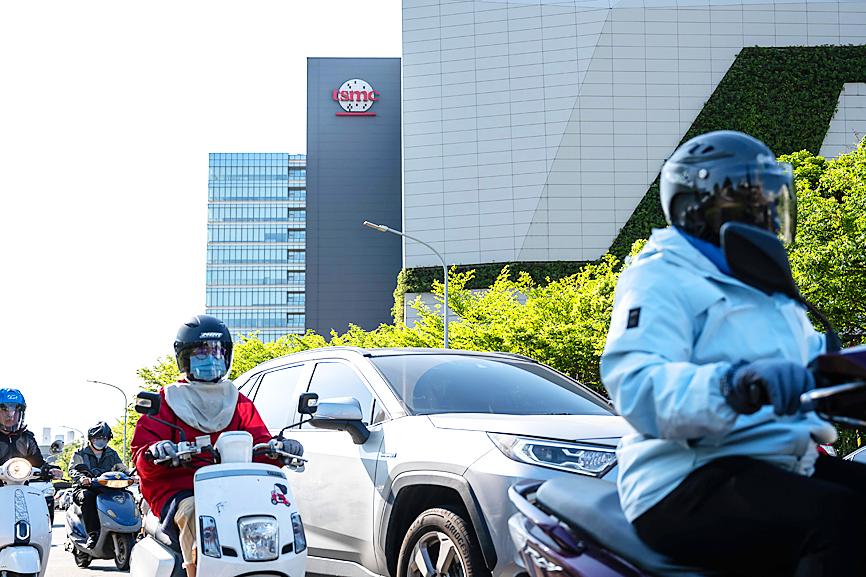Taiwan Semiconductor Manufacturing Co (TSMC, 台積電) yesterday reported a third straight quarter of record sales, underscoring its lead as the world’s No. 1 maker of advanced chips, which are in short supply.
Taiwan’s largest company said that first-quarter revenue climbed 16.7 percent to NT$362.41 billion (US$12.74 billion), compared with the average NT$360.5 billion of analysts’ estimates.
TSMC in the middle of January said that its revenue for the three-month period was expected to range from US$12.7 billion to US$13 billion after the estimate was converted into a range of NT$354.97 billion to NT$363.35, based on the average exchange rate of NT$27.95 at the time.

Photo: Billy H.C. Kwok, Bloomberg
The strong showing in the first quarter came after TSMC smashed its records by posting NT$129.13 billion in sales last month, up 21.2 percent from a month earlier and 13.7 percent from a year earlier.
TSMC has kept its fabs running at “over 100 percent utilization” over the past year, chief executive officer C.C. Wei (魏哲家) told clients in a letter recently.
The company — already planning capital spending of as much as US$28 billion this year — plans to invest US$100 billion over the next three years to expand its capacity, he said.
“TSMC is investing aggressively to capture the structural and fundamental increase in underlying demand driven by long-term growth megatrends from 5G and high-performance computing,” Citigroup Inc analyst Roland Shu (徐振志) wrote in a note.
The spending target implies that TSMC’s revenue could reach as much as US$95.1 billion in 2024 and the firm “is on the march to be the largest semiconductor company by revenue in 2024-2025,” Shu said.
TSMC has scheduled an investors’ conference on Thursday next week to detail its first-quarter results and give guidance for the second quarter, as well as for the whole of this year.
Analysts said that the company’s sales growth momentum would continue with production capacity fully utilized.
As Taiwan faces a serious water shortage, analysts said that the market wants to know how the lack of water would affect TSMC’s operating costs.
Like other tech firms, TSMC has begun buying water by the truckload to meet demand.
Additional reporting by CNA

Sweeping policy changes under US Secretary of Health and Human Services Robert F. Kennedy Jr are having a chilling effect on vaccine makers as anti-vaccine rhetoric has turned into concrete changes in inoculation schedules and recommendations, investors and executives said. The administration of US President Donald Trump has in the past year upended vaccine recommendations, with the country last month ending its longstanding guidance that all children receive inoculations against flu, hepatitis A and other diseases. The unprecedented changes have led to diminished vaccine usage, hurt the investment case for some biotechs, and created a drag that would likely dent revenues and

Macronix International Co (旺宏), the world’s biggest NOR flash memory supplier, yesterday said it would spend NT$22 billion (US$699.1 million) on capacity expansion this year to increase its production of mid-to-low-density memory chips as the world’s major memorychip suppliers are phasing out the market. The company said its planned capital expenditures are about 11 times higher than the NT$1.8 billion it spent on new facilities and equipment last year. A majority of this year’s outlay would be allocated to step up capacity of multi-level cell (MLC) NAND flash memory chips, which are used in embedded multimedia cards (eMMC), a managed

CULPRITS: Factors that affected the slip included falling global crude oil prices, wait-and-see consumer attitudes due to US tariffs and a different Lunar New Year holiday schedule Taiwan’s retail sales ended a nine-year growth streak last year, slipping 0.2 percent from a year earlier as uncertainty over US tariff policies affected demand for durable goods, data released on Friday by the Ministry of Economic Affairs showed. Last year’s retail sales totaled NT$4.84 trillion (US$153.27 billion), down about NT$9.5 billion, or 0.2 percent, from 2024. Despite the decline, the figure was still the second-highest annual sales total on record. Ministry statistics department deputy head Chen Yu-fang (陳玉芳) said sales of cars, motorcycles and related products, which accounted for 17.4 percent of total retail rales last year, fell NT$68.1 billion, or

In the wake of strong global demand for AI applications, Taiwan’s export-oriented economy accelerated with the composite index of economic indicators flashing the first “red” light in December for one year, indicating the economy is in booming mode, the National Development Council (NDC) said yesterday. Moreover, the index of leading indicators, which gauges the potential state of the economy over the next six months, also moved higher in December amid growing optimism over the outlook, the NDC said. In December, the index of economic indicators rose one point from a month earlier to 38, at the lower end of the “red” light.